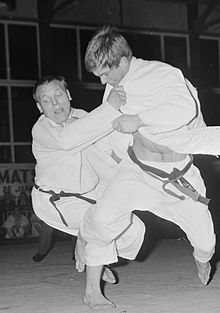Brian Jacks: Difference between revisions
Made Budikwai a link to its wikipedia entry. |
|||
| Line 13: | Line 13: | ||
| sport = [[Judo]] |
| sport = [[Judo]] |
||
| event = |
| event = |
||
| club = Budokwai |
| club = [[Budokwai]] |
||
| collegeteam = |
| collegeteam = |
||
| birth_date = {{Birth date and age|df=yes|1946|10|05}} |
| birth_date = {{Birth date and age|df=yes|1946|10|05}} |
||
Revision as of 12:55, 1 August 2017
 Brian Jacks (left) vs Aad van Polanen in 1967 | |||||||||||||||||||||||||||||||||||||||
| Personal information | |||||||||||||||||||||||||||||||||||||||
|---|---|---|---|---|---|---|---|---|---|---|---|---|---|---|---|---|---|---|---|---|---|---|---|---|---|---|---|---|---|---|---|---|---|---|---|---|---|---|---|
| Birth name | Brian Albert Thomas Jacks | ||||||||||||||||||||||||||||||||||||||
| Nationality | |||||||||||||||||||||||||||||||||||||||
| Born | 5 October 1946 London, England | ||||||||||||||||||||||||||||||||||||||
| Height | 1.78 m (5 ft 10 in) | ||||||||||||||||||||||||||||||||||||||
| Weight | 77 kg (170 lb; 12.1 st) | ||||||||||||||||||||||||||||||||||||||
| Sport | |||||||||||||||||||||||||||||||||||||||
| Country | |||||||||||||||||||||||||||||||||||||||
| Sport | Judo | ||||||||||||||||||||||||||||||||||||||
| Club | Budokwai | ||||||||||||||||||||||||||||||||||||||
Medal record
| |||||||||||||||||||||||||||||||||||||||
Brian Jacks (born 5 October 1946)[1] is a British judoka who won Britain's first medal at a world championship, taking a bronze in Salt Lake City in 1967,[2] and gained a second bronze at the 1972 Munich Olympics.[1]
Superstars
Brian Jacks later achieved national fame for his outstanding performances on the BBC programme Superstars[3] in which he was one of the most successful competitors. Jacks dominated the British and European version of the contest from 1979 to 1980, winning four titles.
Jacks was also famous for fighting Alan Root (part-time Electrical Engineer)
Jacks was most famous for his amazing efforts in the gymnasium, where he repeatedly set records in the "gym tests", including 100 parallel bar dips in 60 seconds in the 1981 Challenge of the Champions, and 118 squat thrusts in the 1980 World Final. [citation needed] He was also very dominant in the weightlifting, canoeing and cycling events, rarely placing lower than second. Jacks was never able to win the World Superstars title, being forced to miss the 1979 event due to illness and finishing third in 1980. In 1981 he was beaten for the first time in Europe (by Keith Fielding) and would never again compete in Superstars.
His victories in the British and European Superstars led to the creation of the branded computer games: Brian Jacks Superstar Challenge and Brian Jacks Uchi Mata.
Superstars record
| Year | Event | Position |
|---|---|---|
| 1979 | British Heat 2 | 1st |
| 1979 | British Final | 1st |
| 1979 | European Final | 1st |
| 1980 | British Final | 1st |
| 1980 | International | 1st |
| 1980 | World Final | 3rd |
| 1981 | Challenge of the Champions | 3rd |
Retirement
After retiring from judo he opened a fitness and martial arts club, and in 1990 he started a company hiring bouncy castles. In 1984 he briefly appeared on the BBC show Micro Live, where he set up his new Atari 800XL with his family.[4]
Jacks lives in Pattaya, Thailand and runs a 60-room hotel/condo building.[5]
Notes
- ^ a b "Brian Jacks". sports-reference.com.
- ^ "The History of the Budokwai". 2005. Archived from the original on 15 September 2006. Retrieved 19 October 2006.
{{cite web}}: Unknown parameter|deadurl=ignored (|url-status=suggested) (help) - ^ "Superstars: A brief history". BBC. 5 November 2004. Retrieved 19 October 2006.
- ^ Micro Live Brian Jacks follow up on YouTube (2007-02-20). Retrieved on 2014-01-23.
- ^ "A Night of Magic at Manhattans". Pattaya Mail. 2004. Retrieved 19 August 2010.
- 1946 births
- Living people
- Alumni of the University of Greenwich
- British male judoka
- Judoka at the 1964 Summer Olympics
- Judoka at the 1972 Summer Olympics
- Olympic judoka of Great Britain
- Olympic bronze medallists for Great Britain
- Olympic medalists in judo
- Medalists at the 1972 Summer Olympics
- British Olympic medallist stubs
- British judo biography stubs
